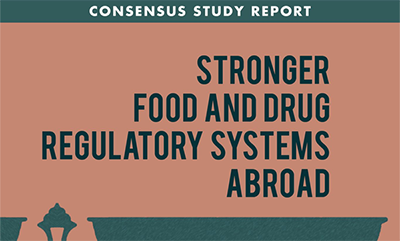Report Offers Framework to Strengthen Food and Drug Regulatory Agencies.
 Effective food and drug regulatory systems are critical components of a functioning global health system. A new report by the National Academies of Sciences, Engineering, and Medicine (NASEM) underscores the need to strengthen these systems to increase worldwide access to safe food and quality medicines, and move closer to achieving the United Nations’ goal of universal health coverage by 2030.
Effective food and drug regulatory systems are critical components of a functioning global health system. A new report by the National Academies of Sciences, Engineering, and Medicine (NASEM) underscores the need to strengthen these systems to increase worldwide access to safe food and quality medicines, and move closer to achieving the United Nations’ goal of universal health coverage by 2030.
The consensus study report was commissioned by the Food and Drug Administration and developed by NASEM’s Committee on Stronger Food and Drug Regulatory Systems Abroad, a group of 12 international experts on food and medication safety, health systems, and policy, including Veronika Wirtz, associate professor of global health.
Released in January, the report provides strategies that regulatory agencies can implement to increase the availability of safe food and medicines around the globe, particularly in low- and middle-income countries. It also suggests actions that US government agencies, international development donors, and the World Health Organization can take to bolster collaboration and capacity-building among food and drug regulators.
 “A functioning national regulatory agency is not only relevant to protect the health of the population in that country but also globally,” says Wirtz, who was appointed to the committee in March 2019. “Food and medicines productions are global enterprises increasing our interdependence. Investing in the development of these institutions as a global public good should be in the interest of our collective social and economic wellbeing.”
“A functioning national regulatory agency is not only relevant to protect the health of the population in that country but also globally,” says Wirtz, who was appointed to the committee in March 2019. “Food and medicines productions are global enterprises increasing our interdependence. Investing in the development of these institutions as a global public good should be in the interest of our collective social and economic wellbeing.”
Globally, it is estimated that more than 400,000 people die each year from consuming unsafe foods, and millions more are at risk of illness or death as a result of poor-quality medicines.
One of the committee’s recommendations is that the World Health Organization (WHO) expand its prequalification of medicine process (a service that ensures select medicines meet international standards of quality and safety) to include treatments for cancer, diabetes, and certain antibiotics. Currently, the program is only applicable to a small group of medicines, mostly for infectious diseases such as for HIV, tuberculosis, and malaria. Expanding this process would ensure that regulators are licensing safe medicines and proper quality controls.
The committee recommends that national regulatory agencies assess their strengths and weaknesses using the recently develop Global Benchmarking Tool as a first step. The assessment is the foundation for the development of an institutional development plan which outlines strategies, actions and timelines to increase the agency performance over time. The report also suggests that international donors, such as the International Finance Corporation, invest in rapid-screening technologies to detect potential contamination of food and medicine.
To improve local manufacturing and quality control, the committee recommends that the FDA, National Institutes of Health, and US Agency for International Development develop a network of Global Centers of Excellence in Regulatory Science, which would partner with academia in low- and middle-income countries.
“The committee was very clear that more investment is needed to solve problems in regulatory science relevant to low- and middle-income countries,” says Wirtz. “The recommended Centers of Excellence, in conjunction with academic institutions, can play in important part in generating the necessary knowledge that regulators in these countries need.”
Wirtz also serves as the director of WHO Collaborative Center in Pharmaceutical Policy that supports the WHO in conducting pharmaceutical program and policy analyses and develops evaluation methods for policy and behavior change interventions. In addition to access and quality of medicines in the public sector, Wirtz’s expertise includes evaluation of private sector-led initiatives.
To view highlights of the study, click here. A full list of recommendations is outlined here.